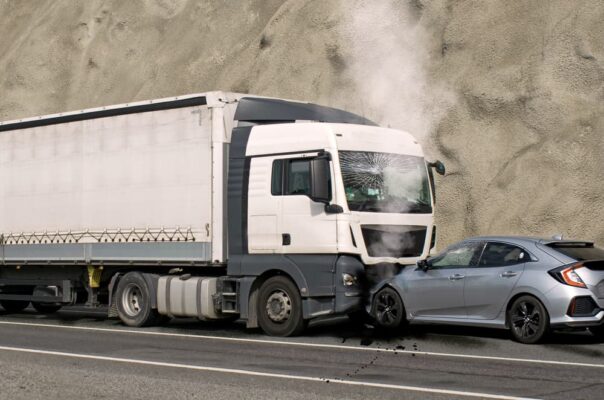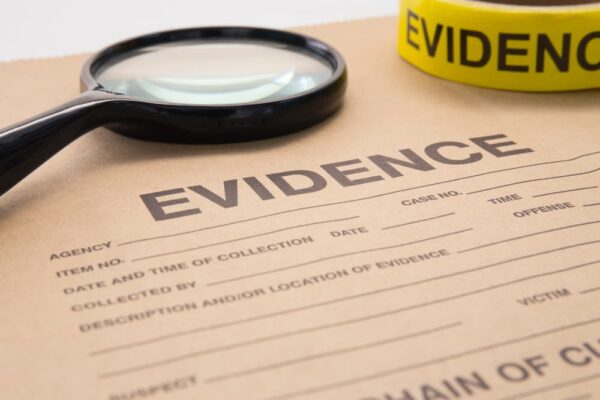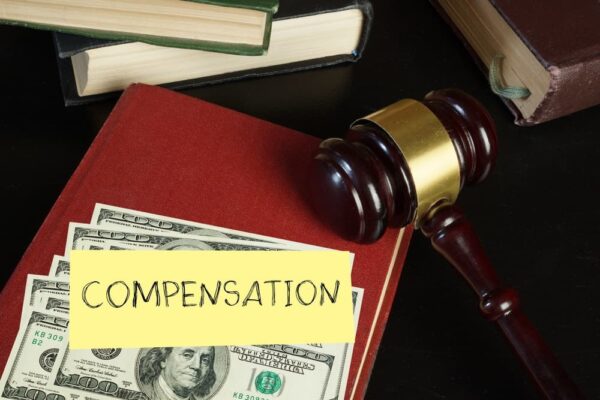The moments after a collision with a large commercial truck can be terrifying and disorienting. The sheer size and weight difference between a semi-truck and a passenger vehicle often lead to devastating consequences. If you are reading this, you or someone you care about may be trying to figure out what to do after a truck accident.
The confusion, pain, and flood of questions are completely normal. Focusing on the next right step is the most important thing you can do for your health and your future.
Key Takeaways for What to Do After a Trucking Accident
- After a truck accident, prioritize medical care, preserve all documents, and avoid giving recorded statements to insurers.
- Truck accident claims are more complex than car accident cases, involving federal regulations and multiple liable parties.
- Liable parties may include the driver, trucking company, cargo loaders, or parts manufacturers.
- You can pursue compensation for economic damages like medical bills and lost wages, and non-economic damages like pain and suffering.
- In Indiana, you generally have two years to file a lawsuit and can recover damages if you are 50% or less at fault.
The Unique Challenges of a Truck Accident Claim
 A crash involving a semi-truck is not just a bigger version of a car accident. These incidents introduce layers of complexity that you simply don’t find in a collision between two passenger cars.
A crash involving a semi-truck is not just a bigger version of a car accident. These incidents introduce layers of complexity that you simply don’t find in a collision between two passenger cars.
The trucking industry is governed by a separate set of federal and state laws, and the potential for catastrophic injuries means the stakes are significantly higher. Drivers traveling on major Indiana highways like I-69 or the busy I-465 loop around Indianapolis know how frequently they share the road with these massive vehicles.
Several factors make these cases distinct:
- Multiple Liable Parties: In a car wreck, you typically deal with the other driver and their insurance. After a truck accident, the responsible party could be the driver, the trucking company that employs them, the owner of the trailer, the company that loaded the cargo, or even the manufacturer of a faulty truck part.
- Federal Regulations: The trucking industry is overseen by the Federal Motor Carrier Safety Administration (FMCSA), which sets strict rules for things like how many hours a driver can be on the road, vehicle maintenance schedules, and driver qualifications. A violation of these rules can be crucial evidence.
- Severe Injuries and Higher Stakes: The immense force in a truck collision often results in life-altering injuries, such as traumatic brain injuries (TBI) or spinal cord damage. This means the financial compensation needed to cover medical care, lost income, and long-term needs is substantially greater.
Understanding these differences is key to navigating the aftermath of a serious truck accident.
Your First Steps at Home After a Truck Accident
The initial chaos at the accident scene is handled by first responders. Your priority is getting the medical attention you need. But once you are back home, the process of protecting your rights begins. This period is critical, and the actions you take can have a significant impact on your recovery and your ability to secure fair compensation.
Prioritize Your Health and Well-being
Your health is the most important thing. Even if you felt fine at the scene or were released from the emergency room, some serious injuries have delayed symptoms. Continuing to monitor your health and document your experience is vital.
Here are some important health-related steps to take:
- Attend All Follow-Up Appointments: Go to every scheduled appointment with your primary care physician, specialists, or physical therapists. This creates an official record of your injuries and treatment plan.
- Keep a Pain and Symptom Journal: Each day, write down your pain levels, any new symptoms you experience, and how your injuries are affecting your daily life. Note activities you can no longer do, from walking your dog at a Fishers park to performing your job duties.
- Follow Medical Advice Exactly: Adhere strictly to your doctor’s orders. This includes taking prescribed medications, resting as instructed, and not returning to work until you are medically cleared.
Diligently tracking your medical journey not only aids in your recovery but also provides clear evidence of the extent of your injuries and their impact on your life.
How to Organize Important Documents After a Truck Accident
 In the days following the crash, you will begin to receive a flood of paperwork. Keeping everything organized from the start will prevent immense stress later on. Find a folder or a safe digital space to store every piece of information related to the accident.
In the days following the crash, you will begin to receive a flood of paperwork. Keeping everything organized from the start will prevent immense stress later on. Find a folder or a safe digital space to store every piece of information related to the accident.
Your document checklist should include:
- The police report or accident report number.
- Contact and insurance information for all parties involved.
- Names and contact details for any witnesses.
- Photos and videos you took of the accident scene, your vehicle, and your injuries.
- All medical records, bills, and receipts for prescriptions or medical equipment.
- Documentation from your employer showing any time missed from work and lost wages.
Having these documents readily available will provide a clear and comprehensive picture of the incident and its financial consequences.
Be Cautious When Speaking About the Accident
Soon after a truck accident, you will likely be contacted by an insurance adjuster from the trucking company. It is important to understand that their goal is to minimize the amount their company has to pay. They are highly trained negotiators looking for any information that can be used to weaken your claim.
Here are some guidelines for communication:
- You are not required to give a recorded statement. You can politely decline. These statements can easily be twisted or taken out of context.
- Do not accept a quick settlement offer. The first offer is almost always far less than what your case is worth and will not account for future medical needs or long-term pain and suffering.
- Be careful on social media. Insurance companies frequently check the social media profiles of claimants. A seemingly innocent post or photo could be used to argue that your injuries are not as severe as you claim.
Limiting your discussions about the accident to your family and your medical providers is a wise approach until you have a clear legal strategy.
Understanding Liability in an Indiana Truck Accident
To recover compensation, you must establish who was responsible, or liable, for the accident. In Indiana, this is based on the legal concept of negligence. Negligence means that a party had a duty to act with reasonable care, they breached that duty, and their breach caused your injuries.
Indiana follows a rule of modified comparative fault, which states that you can still recover damages as long as you are not found to be 51% or more at fault for the accident.
Identifying Potentially Liable Parties in a Truck Accident
Determining who is at fault is rarely straightforward. An experienced legal professional can investigate the crash to identify all parties who may share responsibility.
These parties could include:
- The Truck Driver: If the driver was speeding, distracted, fatigued, or under the influence, they are a primary source of liability.
- The Trucking Company (Motor Carrier): The company may be held responsible for negligent hiring practices, poor training, failing to maintain its vehicles, or encouraging drivers to violate hours-of-service rules.
- The Cargo Loader: If the truck’s cargo was improperly loaded or secured, it could shift during transit, causing the driver to lose control. The company that loaded the freight may be liable.
- A Parts Manufacturer: If the accident was caused by a defective part, such as faulty brakes or a tire blowout, the manufacturer of that part could be held accountable.
A thorough investigation is necessary to uncover all the factors that contributed to the crash and ensure all responsible parties are held accountable.
The Role of Federal and State Regulations
Truck drivers and trucking companies must comply with an extensive list of safety regulations. When these rules are broken, it often leads to accidents. Proving that a trucking company or its driver violated a specific regulation can be powerful evidence of negligence.
Common regulatory violations include:
- Hours-of-Service Violations: The FMCSA limits the number of consecutive hours a driver can be on duty to prevent driver fatigue. Falsified logbooks are often used to hide these violations.
- Improper Maintenance: Companies are required to regularly inspect and maintain their trucks. A failure to repair worn tires, bad brakes, or other critical systems is a serious breach of safety.
- Overloading: Trucks that exceed legal weight limits are harder to stop and more prone to equipment failure, making them a danger to everyone on roads like State Road 37 or U.S. 31.
Evidence such as driver logbooks, maintenance records, and data from the truck’s electronic data recorder (often called the black box) are crucial for proving these types of violations occurred.
What Kind of Compensation Can You Pursue After a Truck Accident?
 A settlement or verdict in a personal injury case is meant to compensate you for all the losses you have suffered because of the accident. These losses are legally categorized as damages and are generally broken down into two types: economic and non-economic. The goal is to make the injured person whole again, at least from a financial standpoint.
A settlement or verdict in a personal injury case is meant to compensate you for all the losses you have suffered because of the accident. These losses are legally categorized as damages and are generally broken down into two types: economic and non-economic. The goal is to make the injured person whole again, at least from a financial standpoint.
Calculating Economic Damages
Economic damages are the tangible, out-of-pocket financial losses that can be calculated with bills, receipts, and pay stubs. These are the most straightforward part of a claim because they have a clear monetary value.
These damages typically include:
- All past and future medical expenses: This covers everything from the initial ambulance ride and hospital stay to future surgeries, physical therapy, and prescription costs.
- Lost wages and income: Compensation for the time you were unable to work while recovering.
- Loss of future earning capacity: If your injuries prevent you from returning to your previous job or working at all, you can be compensated for the income you will lose over your lifetime.
- Property damage: The cost to repair or replace your vehicle and any other personal property destroyed in the crash.
It is essential to keep meticulous records of every single expense you incur as a result of the truck accident.
Understanding Non-Economic Damages in a Truck Accident
Non-economic damages are intended to compensate you for the intangible, personal losses that do not have a specific price tag. While harder to calculate, these damages acknowledge the profound human cost of a severe truck accident.
Non-economic damages may include compensation for:
- Pain and suffering: This refers to the physical pain and discomfort you have endured and will continue to endure due to your injuries.
- Emotional distress and mental anguish: This can include anxiety, depression, fear, sleep disturbances, or post-traumatic stress disorder (PTSD) stemming from the traumatic event.
- Loss of enjoyment of life: This compensates you for the inability to participate in hobbies, activities, and life experiences that brought you joy before the accident.
- Permanent disfigurement or disability: Acknowledges the physical and emotional impact of scarring, amputation, or a permanent physical limitation.
These damages are a critical part of a fair settlement, as they recognize that the true cost of an accident goes far beyond just the medical bills.
FAQs: What to Do After a Truck Accident
Here are answers to some common questions that arise after a collision with a commercial truck.
In Indiana, the statute of limitations for most personal injury cases is two years from the date of the injury. A statute of limitations is a law that sets the maximum time you have to initiate legal proceedings. If you fail to file a lawsuit within this two-year window, you will likely lose your right to pursue compensation forever. It is important to consult with a legal professional well before this deadline approaches.
The vast majority of personal injury cases are settled out of court through negotiations. A settlement is often preferable as it provides a certain outcome and avoids the time and stress of a trial. However, if the insurance company refuses to offer a fair settlement that fully covers your damages, being prepared to take the case to court is the only way to hold them accountable.
The electronic data recorder, or black box, is a device on most commercial trucks that records data like speed, braking, engine use, and hours of service. This data provides an objective account of the truck’s actions leading up to a crash. It often contains powerful evidence of driver error or mechanical failure that a trucking company might otherwise try to erase or destroy.
Trucking companies that operate across state lines must comply with federal regulations and carry specific insurance coverage. The legal case may involve laws from multiple states and federal transportation rules. An investigation can determine where to file the claim and which laws apply to ensure the out-of-state company is held accountable under the proper jurisdiction.
You should always exercise extreme caution with early settlement offers. Initial offers from a trucking company’s insurer are almost always far below the true value of your claim. They do not account for future medical treatment, long-term lost income, or the full extent of your pain and suffering.
Accepting an offer requires you to sign away your right to pursue any further compensation, even if your injuries prove more severe than you first realized. Review any offer with an attorney before you respond.
This is one of the most common defenses trucking companies use to avoid paying for the harm their drivers cause. However, a powerful federal regulation, 49 C.F.R. § 376.12(c)(1), specifically prevents this. 🚚
This Truth-in-Leasing regulation requires any lease agreement for a truck to state that the licensed trucking company assumes “complete responsibility for the operation of the equipment” for the entire lease period.
This language legally forces the company into the position of being responsible. It creates what is known as vicarious liability, treating the driver as a “statutory employee” for the purpose of public safety. As a result, if the truck displayed the company’s name and U.S. Department of Transportation (DOT) number, that company is legally responsible for the crash, regardless of its private contract with the driver.
This regulation ensures that a financially responsible company is held accountable and cannot hide behind the legal status of its drivers.
Contact a Fishers Personal Injury Attorney Today
Dealing with aggressive insurance companies and complex legal procedures while trying to heal from truck accident injuries is a tremendous burden. Having a dedicated and compassionate advocate on your side can make all the difference.
At Wyant Law, attorney Chris Wyant is committed to helping people in Fishers and across Indiana along their road to recovery. With over 16 years of experience handling personal injury cases, he understands the physical, emotional, and financial toll a serious accident takes.
Chris Wyant believes in being approachable and providing honest, straightforward guidance. He will listen to your story, investigate your accident, and work tirelessly to help you secure the compensation you need to move forward.
If you have questions about what to do after a truck accident, contact Wyant Law at (317) 683-0333 or through our online form for a free, no-obligation consultation to discuss your situation and learn about your options.

